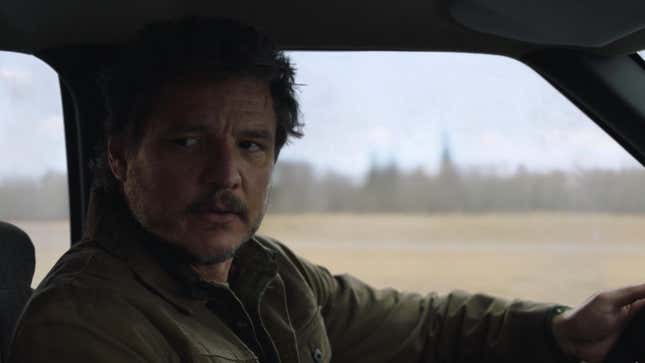
After last week’s knockout episode of HBO’s The Last of Us boldly adapted the game’s source material into something wholly new and remarkable, this week’s episode returns to more conventional adaptation, giving viewers a number of moments lifted directly from the game, though the action has been transferred from Pittsburgh to Kansas City for the show.
However, it’s not slavishly faithful, either; episode 3 (titled “Please Hold to My Hand,” a nod to the lyrics of Hank Williams’ song “Alone and Forsaken”) continues to develop our main characters in ways that interestingly differentiate them from their gaming counterparts, and expand on the world and narrative, which we see here in how Kathleen and Perry provide added depth and motivation to the raiders that threaten Joel and Ellie throughout. Let’s get into it.
Ellie’s got a gun
The first image we see is Ellie looking in the mirror, pretending to fire the gun she…umm…acquired at Bill and Frank’s place. Whereas Ellie in the game is still constantly reacting with shock and horror as Joel offs bad guys at this point, her TV show counterpart still seems excited by it, and perhaps anxious for a chance to prove she can effectively dish it out.
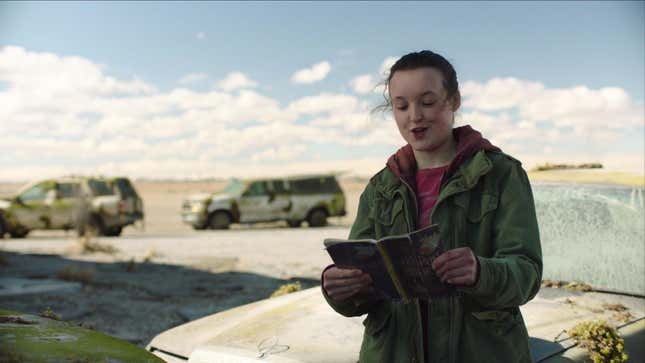
But for all the ways Ellie is different in the show, in others, she remains much the same. Outside, Joel’s siphoning gas from an old car and tells her to stay close. “Okay, this is your fault then,” she says, and breaks out a book of awful jokes. “It doesn’t matter how much you push the envelope,” she reads. “It’ll still be stationery.” That’s the very same joke she begins torturing Joel with in the game as well. It’s a great scene because Bella Ramsey’s Ellie so clearly delights in the jokes, and Pedro Pascal’s Joel so clearly suffers as a result of them. “Feel free to wait in the truck,” he deadpans after hearing a few.
Alone and Forsaken
Then comes another parallel between the game and the show. In dialogue that’s almost word-for-word from the source material, Ellie presents Joel with a tape of Hank Williams tunes, asking him if it makes him “all nostalgic.” He protests that it’s before even his time, but it’s “a winner” nonetheless. In the game, the first song that comes on is “I’ll Never Get Out of This World Alive,” though in the show it’s “Alone and Forsaken,” which was also used in the show’s original teaser trailer. Then comes the hilarious bit, also faithfully recreated from the game, where Ellie looks through one of Bill’s porn mags, eventually asking Joel, “Why are these pages all stuck together?” Joel stammers uncomfortably before Ellie reveals she’s just fucking with him and throws the mag out the window.
I love the shots that follow of scenery Ellie sees scrolling by out the window: an empty amusement park; overgrown truck stop signage; buffalo grazing, seemingly unbothered by the end of human society. A huge part of what makes the game so compelling is the experience of being in its incredibly detailed, post-collapse world—taking in the haunting beauty of its empty coffee shops, suburban homes, and city streets—and I appreciate those moments when the show gestures at that wider world, reclaimed from the people who once dominated it.
Chef Boyardee brings people together
Joel pulls off the road to camp for the night, the truck he took from Bill’s gliding gorgeously through the tall grass, and cooks them a dinner of “20-year-old Chef Boyardee ravioli.” “That guy was good,” she replies while stuffing her face. “I actually agree,” Joel says. Common ground is a beautiful thing.
And over their feast, when Ellie asks if they can start a fire, Joel introduces the idea of a new danger: not FEDRA and not infected, but ragtag human hunters. It’s also in this stretch of game that hunters first become a real threat, taking precedence over infected as you make your way through Pittsburgh. Joel ominously establishes the threat in our minds by telling Ellie, who asks if hunters will rob them, “Oh, they’ll have way more in mind than that.”
As the two prep for bed using sleeping bags that used to be Bill and Frank’s, we get a sweet moment where Ellie asks Joel if she can ask him a serious question. He says yes, and she, still playing it totally straight, asks him why the scarecrow got an award. He thinks for a moment, then says “‘Cause he was outstanding in his field?” Ellie’s momentarily flabbergasted, then actually does ask a serious question: “There’s no way anyone knows we’re here, right? No one’s gonna find us?” “No one’s gonna find us,” he says, wanting to reassure her, but with his rifle close at hand he doesn’t look too sure himself, and he ends up staying up much of the night to keep watch.
“You’re cargo”
Now we come to one of the most important differences between the world of the game and the world of the show: coffee. In this stretch of the game, Joel laments the lack of coffee in his life. At one point Ellie asks him if he used to go to coffee shops and he says he did, all the time. At another, as you regard a coffee machine in the Pittsburgh hotel lobby, Joel will comment aloud that he misses coffee. While his TV show mirror can’t exactly score himself a fancy latte or mocha, though, he does have coffee on hand thanks to Bill’s stockpile of goods, as Ellie finds out when she wakes up the next morning.
“You don’t like coffee?” Joel asks with a hint of understated humor as she recoils in disgust from the bubbling pot. A short time later in the truck, she tells him the coffee smells like “burnt shit” and in response he slurps greedily at his Thermos. Things between them are almost starting to feel nice at this point. Fear still lurks at the edges, but it’s beginning to seem as if the two are enjoying the journey and each other’s company. We know the pleasantness can’t last.
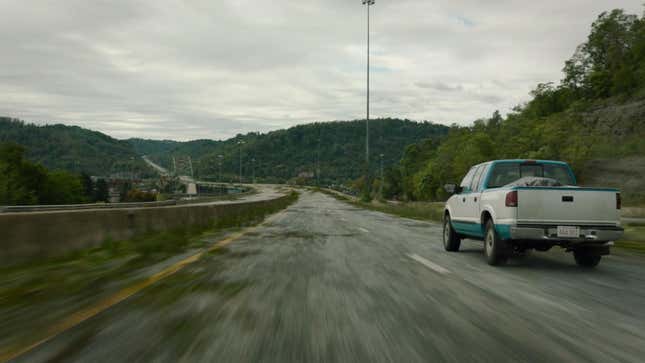
She asks him about his brother and, in typical Joel fashion, he tries to rebuff her, saying it’s a long story. She points out that they’ve got nothing but time, though, and he relents, offering her, and us, insight into how he sees Tommy.
Joel calls Tommy a “joiner,” someone who’s always driven by the hope, or, in his eyes, the delusion, of being a hero, making a big difference, saving the world. It’s what drove Tommy to join the Army right out of high school and it’s what drove him, many years later, to join the Fireflies after he met Marlene. Now he’s left the Fireflies too, and Joel thinks of him as being effectively on his own out in Wyoming, meaning it’s up to him to get out there and save his younger brother. Hearing the disdain in Joel’s voice for Tommy’s idealism, Ellie asks, “If you don’t think there’s hope for the world, why bother going on?” “You keep going for family,” Joel says. “That’s about it.” When Ellie says she’s not family, Joel quickly agrees, telling her she’s cargo. “I made a promise to Tess,” he says, “and she was like family.”
Trouble in Kansas City
Outside Kansas City, the two find their path blocked by the remains of old traffic, so just like the game’s Joel outside Pittsburgh, Pedro Pascal says “Screw it” and heads off the highway and into the city itself. This turns out to be a mistake. (I appreciate how a movie theater they drive past has Mystic River, Matchstick Men, and Underworld among the films on its frozen-in-time marquee.) Soon, in another parallel to the game, a man stumbles toward them pleading for help. (It’s here in the game that Hank Williams’ “Alone and Forsaken” is used, and it continues to play from the truck’s radio during the combat sequence that follows.) In both versions of the story, this is just an elaborate trap laid out by hunters, whose attacks force Joel to crash into the remains of an old storefront.
The grueling gunfight that follows suggests that, despite what he says, Ellie is more to him than just cargo, and his instincts as a protector kick in. He tells her to climb through a hole in a nearby wall and hide, then risks his own life to provide cover for her as she sneaks away.
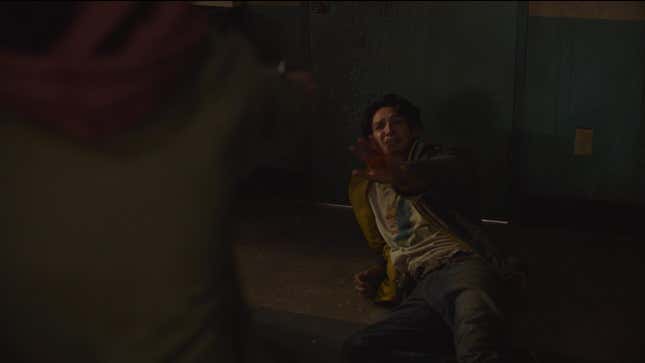
And here Ellie must come to Joel’s rescue, closely mirroring a scene that happens in the game’s Pittsburgh hotel. Here as there, Joel is nearly suffocated by a hunter before Ellie shoots the assailant. In the game, it’s a clean kill, but what follows here is an agonizing scene in which the wounded hunter pleads desperately for his life. In my opinion it’s the most gut-wrenching scene in the episode, maybe one of the most excruciating in the entire series. It’s hard to hear the things the young man says—”my mom isn’t far”—knowing that Joel would see letting him live as a liability.
Ideologically, I’m not a fan of how ubiquitous the idea is in video games and grimdark movies and TV shows that killing is often just a given, a necessity, once the world collapses. (It’s all that damn bell hooks and Rebecca Solnit I’ve read, making me think a better world is actually possible.) However, given that these are the ideas that The Last of Us is committed to trafficking in, the scene is effectively harrowing, and I appreciate that Ellie, for all her earlier posturing in the mirror with the gun, finds the cost of real violence rather hard to take.
Meeting Kathleen…
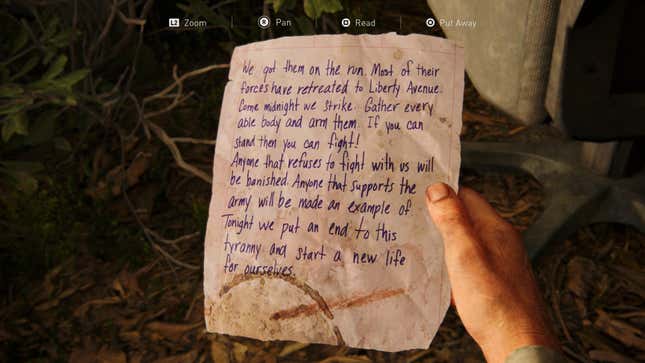
In the game, we know that the hunters of Pittsburgh have effectively liberated the city from the local FEDRA branch, which was a cruel and oppressive institution, denying people rations and brutally keeping citizens in line. Having done so, however, the rebels prove to be no better than those they overthrew. In one sequence, for instance, they run people down with a Humvee they’ve repurposed and kill them in cold blood, only to find that they have nothing of value on them. The whole operation is grisly and murderous, but if there’s anyone in charge of it all, we never meet them.
The show expands on the revolution, giving it a leader named Kathleen (Melanie Lynskey, Yellowjackets) who we first meet as she interrogates a doctor in a reclaimed FEDRA facility, about the whereabouts of other “collaborators” who previously worked with the oppressive government agency.
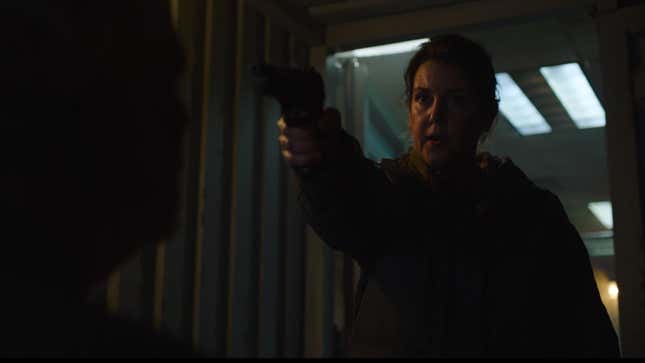
What makes the casting of Lynskey in the role so effective is that, as Kathleen, she gives off an attitude of almost naive innocence, which clashes so intensely with the ruthlessness of her actions. It tells us that, in her mind, what she is doing is right, and she has no qualms whatsoever about imparting terrible violence on those she feels wronged her or her cause.
The doctor pleads ignorance as she rattles off a list of names, and then we get a clue as to Kathleen’s motivation. “I wonder,” she muses, “if this is the cell where my brother was beaten to death.” The doctor, an older man who seems very sincere in his compassion for her, says “You were wronged, and I’m sorry. But this has gone too far. It has to stop.” “Oh, it has to stop now, you mean? Now that you’re in the cell. But before, people dying was okay, when you were safe and protected and ratting on your neighbors to FEDRA.” When he protests that FEDRA put a gun to his head, she does the same and asks, “Have I satisfied the necessary conditions for you to talk?”
Kathleen is not without her humanity, and when the man says that he delivered her, she’s clearly moved and hesitant to kill him. But she’s also desperate to find a man named Henry, who she blames for giving FEDRA information on her brother. (In the game, Henry and his younger brother Sam exist, but they have no larger connection to the events in Pittsburgh, having just come there from their home in Hartford, Connecticut to scavenge for supplies.) Before she can get any information from the doctor, Kathleen hears a horn from outside, and goes to heed its call.
…and Perry, her right-hand man
Outside, members of her organization have brought the hunters Joel fought off, now dead or dying, back to base. Nearby stands a man, absolutely commando’d the fuck out, named Perry (played by Jeffrey Pierce, who voices Tommy in the games). He tells her they suspect outsiders, possibly mercs. And now we see just how deep Kathleen’s obsession with Henry goes. She instantly links the presence of these “mercs” to him, saying maybe he used a radio to “call these guys in.” Driven by the deaths of her own men, she goes back in to kill the doctor, then comes back outside to rile the crowd up by lying through her teeth.
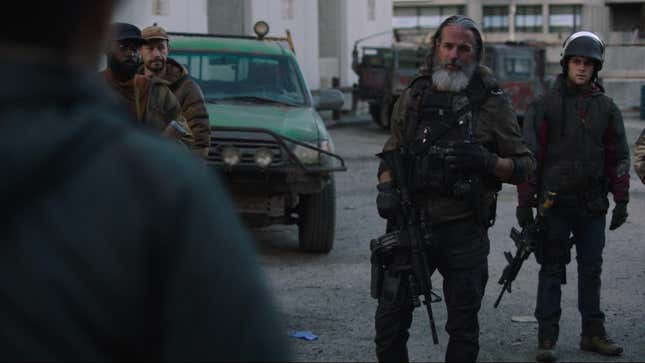
“This is Henry’s work,” she says. “And he won’t stop until we stop him. Find every collaborator and kill them all,” she orders, sending her people out in all their reclaimed FEDRA vehicles to bash down doors and blow some heads off. I guess you either die young or you live long enough to become the new world order jackboot fucks you once sought to overthrow.
Personally, I’m way past exhausted with the ubiquity in video games (and, here, television inspired by video games) of presenting the people who throw off their vile oppressors as equally bad (see, notoriously, Bioshock Infinite), but here we are. I’m just hoping we see different, better visions of post-apocalyptic society in this series before all is said and done, some that show humanity’s capacity to be helpful, mutually supportive, and collaborative in times of crisis.
A history of violence
Hiding out in an old bar, Joel and Ellie get to talking about how she just saved his life, and it plays out very differently from the game. There, Joel is visibly angry after she shoots the hunter suffocating him, unable to admit, for a while, that he would have died otherwise, much less to express any gratitude for it. The closest he eventually gets is finally saying, “To be clear, it was him or me,” to which Ellie says, “You’re welcome.”
Here, he’s more open about his feelings, but they’re feelings of regret and failure rather than gratitude. “I know what it’s like, the first time that you, uh, hurt someone like that. If you, uh…I’m not good at this,” he says awkwardly, before telling her that it was his fault she had to do something so awful, and he’s sorry. When she tells him it wasn’t her first time, he pulls out the pistol and gives her pointers on how to hold it, seeming much more confident speaking the language of proper firearm technique than he does the language of emotion. But in his own way, this is a gesture of kindness and bonding. It’s clear that there’s care underlying it, even if he can’t find the language to actually express the care and concern he feels. (Interestingly, Joel also finally gives her a pistol in this stretch of the game. The Ellie of the show, however, continues to appear much more excited about guns than the one in the game does.)
On Henry and Sam’s trail
Perry tells Kathleen that he’s found a sign of Henry and Sam, and leads her into a cramped attic space in a nearby building. Endearing crayon drawings of a child-sized superhero decorate the space, while empty tin cans suggest they ran out of food and had to move on. That’s not all Perry has to show Kathleen, however.
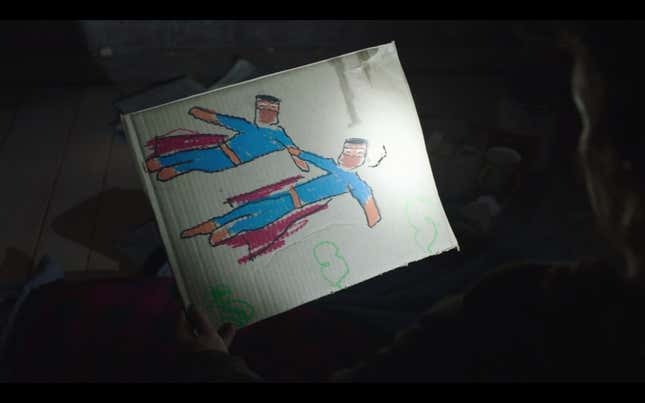
Down in the basement, a patch of ground has cracked and sunken in. Just what it means goes unspoken, but given the way it periodically shifts, causing Kathleen to shout “fuck!” and retreat from the room, my money’s on it having something to do with infected. Perry clearly considers it a matter of some urgency, but Kathleen continues to be focused on Henry and Sam. “Let’s just handle what we have to handle,” she says. “We can deal with this after.” It’s a bold strategy. Let’s see if it pays off for her.
I really like Perry, as a character if not a person. He gets no elaborate backstory, no flashbacks to develop him in our eyes, and yet Jeffrey Pierce’s performance tells us all we need to know. It’s clear he’s got a military background and he believes in the importance of hierarchy, of following orders, even when he doesn’t necessarily agree with those orders. You get the feeling that he’d go to the ends of the earth in support of Kathleen’s crusade, regardless of his own feelings, and that makes him dangerous.
Did you know diarrhea is hereditary?
Meanwhile, Joel boosts Ellie up through a window in what might be a deliberate nod to a frequent mechanic in the game. The two proceed to climb a few dozen flights of stairs in a dark old apartment building, and have a conversation that, like so much of this episode, clearly mirrors a moment from the Pittsburgh section of the game. Ellie asks Joel how he knew the guy asking for help wasn’t hurt, and he says he’s been on both sides, that he and Tess and the crew they ran with “did what we needed to survive.” In both cases, Ellie asks Joel if he killed innocent people. In both, he doesn’t give a straight answer, but it’s clear enough what the answer is.
So the Joels have that in common. But just as the show’s Ellie is different from the game’s in a few key ways, so too is the show’s Joel different from this game counterpart. Whereas the Joel of the game has remarkable stamina for a man in his mid-to-late 50s and is able to crawl silently around and strangle the life out of eight or 10 people without breaking a sweat, the Joel of the show is believably weathered and weary. After 33 flights, he’s pretty much had it, collapsing momentarily against a wall to catch his breath. I’m glad they opted to give him reasonable human limitations in the show; I never noticed the lack of them in the game, but this is television, and now he’s being played by a flesh-and-blood human being, so it only makes it feel more grounded and believable.
Joel scatters broken glass across the entrance of the room they hole up in so that any intruders will make their presence known. Then Joel, usually the one to rebuff Ellie’s personal questions, gets a taste of his own medicine when he asks her what she meant when she said shooting the hunter today wasn’t her first time visiting such violence on someone. “I don’t want to talk about it,” she says.
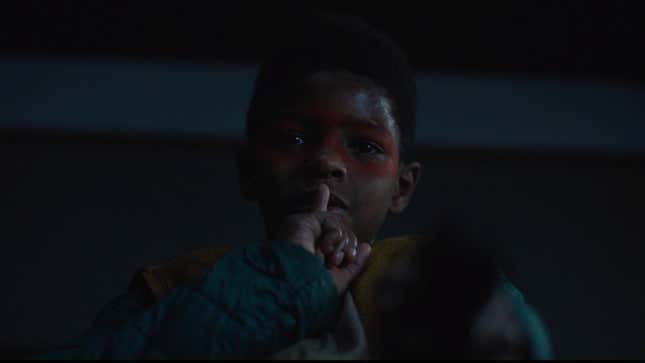
She also points out another one of Joel’s limitations in the show, saying she’s noticed he doesn’t hear too well out of his right ear, so she was worried he may not hear it even if someone does sneak in and step into his glass trap. (In the game, Joel has supernaturally keen hearing, letting him pinpoint the locations of enemies through walls and at great distances.) His poor hearing in his right ear may be related to the time a bullet grazed him, but if there’s more to that story, we’ll have to wait to hear it.
Before they fall asleep, Ellie finally gets a laugh out of him with one of her awful jokes. It’s another endearing moment in their developing bond, but alas, sweet dreams will elude them. Sometime in the night Ellie wakes Joel up. They’re being held at gunpoint by an adult and a child who has a superhero mask painted on his face. No doubt this is Henry and Sam. In the game, Joel and Ellie encounter the two by chance while fleeing from the humvee patrolling the streets. This is a different start to their relationship. We’ll have to wait until next week to see how things play out from here.
Righting old wrongs
Over the end credits, we hear Lotte Kestner’s cover of New Order’s “True Faith.” Interestingly, this cover was the basis for a version of the song that Ellie sang in a commercial for The Last of Us Part II, which prompted Kestner to tweet about the unauthorized use of her cover. Naughty Dog’s Neil Druckmann soon tweeted an apology for the “oversight” and said they were working to rectify it and that Kestner deserved recognition for her work. Hearing it featured here is a nice coda to the story, and hopefully gets Kestner’s lovely cover more recognition still.